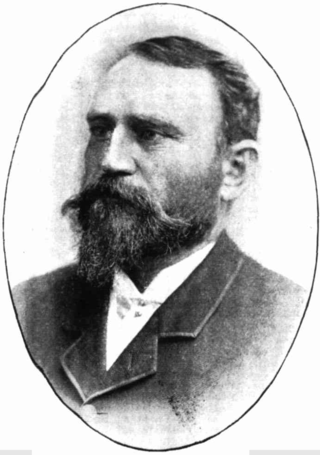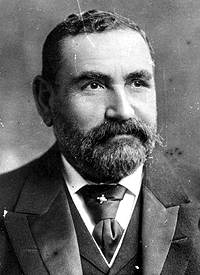Related Research Articles

Bernhard Ringrose Wise, commonly referred to as B. R. Wise, was an Australian politician. He was a social reformer, seen by some as a traitor to his class, but who was not fully accepted by the labor Movement. He said, "My failure in Sydney has been so complete—my qualities those which Australia does not recognise, my defects those which Australians dislike most." When he died, William Holman said, "There is hardly anything in our public life which we have to consider to-day that cannot be traced back to his brilliant mind and clear foresight … [Wise] held undisputed supremacy as the foremost debater, foremost thinker and foremost public man in the life of New South Wales".
South Sydney was an electoral district for the Legislative Assembly in the Australian state of New South Wales from 1880 to 1894, covering the southern part of the current Sydney central business district, Haymarket, Surry Hills, Moore Park and Chippendale, bordered by George Street, Broadway, City Road, Cleveland Street, South Dowling Street, Dacey Avenue, the western edge of Centennial Park, Moore Park Road, South Dowling Street, Oxford Street and Liverpool Street. It elected four members simultaneously, with voters casting four votes and the first four candidates being elected. For the 1894 election, it was replaced by the single-member electorates of Sydney-Phillip, Sydney-Belmore, Sydney-Flinders and Sydney-Cook.

John Henry Want was an Australian barrister and politician, as well as the 19th Attorney-General of New South Wales.

James Henry Young was an Australian colonial businessman and politician and Speaker of the New South Wales Legislative Assembly.
Thomas George Rusden was a squatter and politician in colonial New South Wales. He was a member of the Legislative Council between 1855 and 1856 and a member of the Legislative Assembly for one term between 1856 and 1857.
The Parker ministry was the third ministry of the Colony of New South Wales, and was led by Henry Parker. Parker was elected in the first free elections for the New South Wales Legislative Assembly held in March 1856 and, following the failure of the Donaldson and Cowper Governments to maintain the confidence of the Assembly, was asked to form Government.

The See ministry was the 30th ministry of the New South Wales Government, and was led by the 14th Premier, Sir John See. The title of Premier was widely used to refer to the Leader of Government, but was not a formal position in the government until 1920. Instead the Premier was appointed to another portfolio, usually Colonial Secretary.

Sir Robert Wisdom, was a politician in colonial New South Wales and Attorney General of New South Wales.
This is a list of members of the New South Wales Legislative Council from 1843 to 1851. The 1843 Electoral Act prescribed 36 members, 24 to be elected, 6 appointed by virtue of their office and 6 nominated. The appointments and elections were for five year terms and thus occurred in 1843, and 1848. The Speaker was Alexander Macleay until 19 May 1846 and then Charles Nicholson. The parliament was dissolved on 30 June 1851 as a result of the 1851 Electoral Act which increased the number of members in the Council to 54.
Members of the New South Wales Legislative Council who served from 1898 to 1901 were appointed for life by the Governor on the advice of the Premier. This list includes members between the election on 27 July 1898 and the election on 3 July 1901. The President was Sir John Lackey.
Members of the New South Wales Legislative Council who served from 1856 to 1861 were appointed for a fixed term by the Governor on the advice of the Premier. The 1855 Constitution of New South Wales provided that the first council following self-government was for a period of 5 years from the first appointments, but that subsequent members would be appointed for life. The first appointments were on 13 May 1856 so that the first term lapsed on 13 May 1861. The number of members of the council had to be at least 21 and subsequent appointments also lapsed on 13 May 1861. The President was Sir Alfred Stephen until 28 January 1857, John Plunkett until 6 February 1858 and then Sir William Burton.
A by-election was held for the New South Wales Legislative Assembly electorate of Bathurst on 8 February 1884 as a result of the Legislative Assembly declaring the seats of Francis Suttor, and George Reid, were vacant as a result of a report of the Committee of Elections and Qualifications that they were incapable of being elected, or of sitting, or voting, as a member of the Assembly.
A by-election was held for the New South Wales Legislative Assembly electorate of East Sydney on 29 February 1884 as a result of the Legislative Assembly declaring the seats of Francis Suttor, and George Reid, were vacant as a result of a report of the Committee of Elections and Qualifications that they were incapable of being elected, or of sitting, or voting, as a member of the Assembly.
A by-election was held for the New South Wales Legislative Assembly electorate of Ashfield on 26 September 1899 because Bernhard Wise (Protectionist) had been appointed Attorney General. Until 1904, members appointed to a ministerial position were required to face a by-election. These were generally uncontested. Of the nine ministers appointed with the formation of Lyne ministry, Ashfield and Hume were the only electorates in which the by-election was contested.
A by-election was held for the New South Wales Legislative Assembly electorate of Balmain South on 6 December 1902 because of the resignation of Sydney Law from Labour and the parliament. Following the 1901 election, the Progressive Party had formed a government with the support of Labour. In 1902 a man named Moss Friedman had been found guilty by a jury, however the judge disagreed with the guilty verdict. The Attorney General, Bernhard Wise, remitted Friedman's sentence and Joseph Carruthers, the Leader of the Opposition, moved a motion in the Legislative Assembly to censure Wise. Law voted in support of the motion despite a Labour decision to oppose it. Law chose to resign and recontest the seat as an Independent Labour candidate.
In October 1894 the Elections and Qualifications Committee conducted a re-count of the 1894 Grenfell election, in which George Greene had been declared elected by a margin of 2 votes over Michael Loughnane (Labour). The Elections and Qualifications Committee consisted of 9 members, 5 Free Trade and four Protectionist.
A by-election was held for the New South Wales Legislative Assembly electorate of The Hastings on 4 July 1870 as a result of the Legislative Assembly declaring the election of Horace Dean was void. Dean had been appointed the postmaster at Tinonee at the time of the nominations for the 1869 election and resigned the following day. The Committee of Elections and Qualifications held that because he had an office of profit under the crown at the time of his nomination meant he was incapable of being elected, or of sitting, or voting, as a member of the Assembly.
New England, an electoral district of the Legislative Assembly in the Australian state of New South Wales, was created in 1859 and abolished in 1894.
A by-election was held for the New South Wales Legislative Assembly electorate of Paddington on 12 January 1888 because William Trickett was appointed to the Legislative Council.
References
- 1 2 "Mr Bernhard Ringrose Wise (1858-1916)". Former members of the Parliament of New South Wales . Retrieved 13 May 2019.
- 1 2 Rutledge, Martha. "Foster, William John (1831–1909)". Australian Dictionary of Biography . Canberra: National Centre of Biography, Australian National University. ISBN 978-0-522-84459-7. ISSN 1833-7538. OCLC 70677943 . Retrieved 8 May 2021.
- ↑ "Writ of election: South Sydney". New South Wales Government Gazette . No. 315. 1887. p. 3657. Retrieved 8 May 2021– via Trove.
- 1 2 Green, Antony. "1887 South Sydney by-election". New South Wales Election Results 1856-2007. Parliament of New South Wales . Retrieved 8 May 2021.
- ↑ "Petition: election for South Sydney". New South Wales Government Gazette . No. 339. 13 June 1887. p. 3921. Retrieved 8 May 2021– via Trove.
- ↑ "Meeting of the Elections and Qualifications Committee of the Legislative Assembly". The Sydney Morning Herald . 17 June 1887. p. 7. Retrieved 8 May 2021– via Trove.